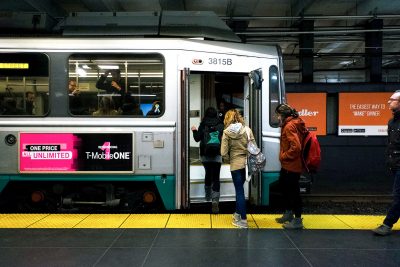The Massachusetts Bay Transportation Authority resumed front-door boarding and fare collection on buses, street-level Green Line stops and the Mattapan line on Monday.

The MBTA had restricted boarding to rear doors in March to slow the spread of the coronavirus.
Protective barriers have been installed between operators and riders, according to an MBTA press release.
All passengers must still wear face coverings and hand sanitizer dispensers are available in stations, according to the MBTA website. Frequently touched surfaces in stations are cleaned every four hours.
Kristiana Lachiusa, community engagement manager at LivableStreets Alliance, an advocacy group for equitable transportation in Boston, said LivableStreets disapproves of the MBTA’s decision because it hurts marginalized communities that rely on public transportation.
“COVID-19 has, as we’ve seen many many studies now, disproportionately impacted low-income and especially Black Indigenous people of color,” Lachiusa said. “Low-income folks and communities of color have been the ones who have continued to ride transit the most.”
MBTA’s reopenings not only increases stress on finances, Lachiusa said, but also health for these communities.
“We were pretty frustrated to see them adding both another financial burden on those who are continuing to use the system at this moment,” Lachiusa said, “but, more importantly, it kind of gets away from the main safety imperative that the MBTA has to keep people safe.”
The MBTA is monitoring ridership levels, Lachiusa said. One way she said riders can combat safety hazards is by notifying the MBTA if they notice overcrowding, via Twitter or the customer service line.
“If you’re riding the bus right now and if you’re noticing that there’s more crowding, [let] the MBTA know that,” Lauchiusa said. “It’s always helpful for riders to let them know what they might be missing.”
Other community advocacy groups have expressed opposition to resuming fare collection and front-door boarding. On July 16, a Make Shift Boston Instagram post encouraged people to contact their elected officials in protest of the policy.
MBTA Spokesperson Lisa Battiston wrote in an email that passengers will still exit from the rear doors to preserve one-way pedestrian flows. Decals have been added to the seats closest to operators to encourage riders to sit away from the operators.
Tim Lasker, president of OPEIU Local 453, MBTA’s second-largest union, said he believes on-site workers should also receive hazard pay.
Battiston did not respond to multiple requests for comment on hazard pay for MBTA employees.
Lachiusa said the MBTA relies on fares for its funding, but has received government funds to support operating costs during the pandemic.
The MBTA’s fare revenue for April, May and June dropped by 88 percent compared to pre-pandemic levels, according to Battiston.
Battiston wrote that the MBTA appreciates the consistent work of its employees during the pandemic.
“Our workforce has shown up every day since the beginning of the pandemic to provide transportation service,” Battiston wrote, “and we continue to express our deep gratitude for the men and women of the MBTA and the absolutely essential work that they do.



























































































































